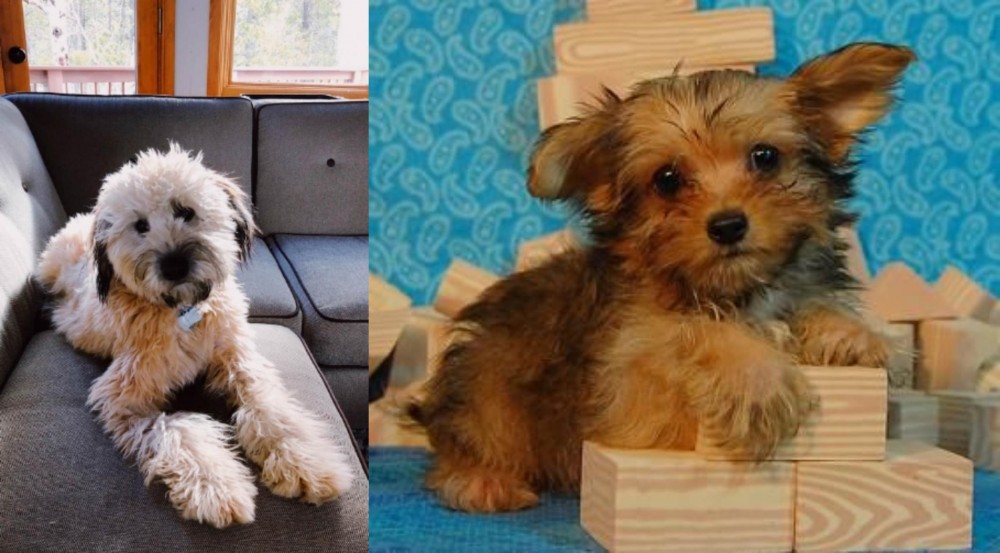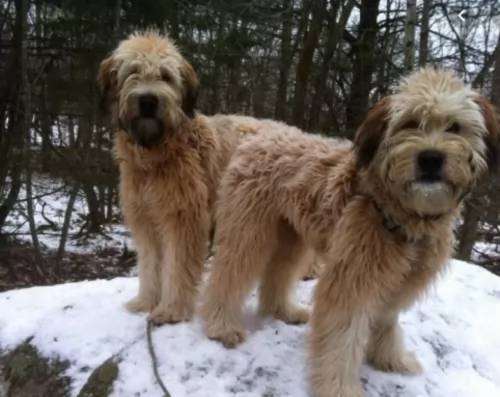 Both Whoodles and Yorkillon are originated from United States. Whoodles may grow 27 cm / 11 inches higher than Yorkillon. Whoodles may weigh 16 kg / 36 pounds more than Yorkillon. Both Whoodles and Yorkillon has almost same life span. Both Whoodles and Yorkillon has almost same litter size. Both Whoodles and Yorkillon requires Moderate Maintenance.
Both Whoodles and Yorkillon are originated from United States. Whoodles may grow 27 cm / 11 inches higher than Yorkillon. Whoodles may weigh 16 kg / 36 pounds more than Yorkillon. Both Whoodles and Yorkillon has almost same life span. Both Whoodles and Yorkillon has almost same litter size. Both Whoodles and Yorkillon requires Moderate Maintenance.
Basic Information
Group:
Companion dog
Toy dog
undefined
United States
United States
Life Span:
12 - 15 Years
12 - 14 Years
Other Names:
Wheatendoodle, Wheatenpoo
Papa-ShirePapa-Shire • Papiyork • Yorkie Pap Papillon-Yorkshire Terrier Mix, Papillon-Yorkie Mix,
Colors Available:
brown, grey, cream and red., Black
White, brown and white, light brown/golden, dark brown/chocolate, black and brown, black
Coat:
Medium length, silky, wavy
Straight, medium, fine fine, soft coat
Temperament:
Affectionate, Alert, Cheerful, Courageous, Curious, Docile, Friendly, Gentle, Independent, Intelligent, Lively, Loving, Loyal, Outgoing, Playful, Protective, Quiet, Responsive, Social, Sweet, Territorial
Alert, Energetic, Friendly, Loving, Loyal, Playful
Grooming:
Moderate Maintenance
Moderate Maintenance
New Owners Friendly:
Yes
Yes
History
 Known also as the Wheatenpoo or the Wheatendoodle, the Whoodle is a teddy-bear kind of mixed-breed dog, being a cross between Poodles and the soft-coated Wheaten Terrier.
Known also as the Wheatenpoo or the Wheatendoodle, the Whoodle is a teddy-bear kind of mixed-breed dog, being a cross between Poodles and the soft-coated Wheaten Terrier.
He came about in the mid-1900s so he is still quite a new breed. Like with most hybrid breeds, the Whoodle doesn’t have a well-documented history.
Because most hybrids hail from the USA, one can assume that the Whoodle comes from there as well.
The Yorkillon is a bighearted cross between the Yorkshire Terrier and the Papillon. They are small dogs with huge attitudes and big ears. They are known to be sassy and get into trouble. They are playful, affectionate and intelligent. They were initially developed in the US sometime about 20-30 years ago.
Not recognized by the American Kennel Club as they are considered designer dogs or mixed breeds
Description
 The Whoodle is a medium-sized dog that stands at between 30 and 50cm in height and weighs in the region of 9 to 20kg.
The Whoodle is a medium-sized dog that stands at between 30 and 50cm in height and weighs in the region of 9 to 20kg.
He has a silky, medium-length coat that can be fairly straight or wavy and which is available in a range of colors – black, brown, grey, cream and red.
He isn’t a heavy shedder, but their hair can grow fairly long so he will have to be groomed one way or the other. Many people choose to have him trimmed at the doggy salon. With the Poodle being in the mix, it is thought that the Whoodle coat is hypoallergenic, sought after by dog owners who suffer from allergies.
Temperament:
Just because of the dog breeds your Whoodle dog comes from, you can know that you’re going to have a playful, happy, friendly, outgoing, social pet who will have no doubt inherited a lot of good qualities from both parent breeds.
He will happily settle down with you in the city or the countryside. He absolutely loves human company and isn’t the kind of dog to be put outside for hours separated from his humans.
If there are children in the home, they’ll discover that this little dog is always up for a game. He gets on well with children and other pets. Early training and socialization will be imperative for the Whoodle as he is a strong-willed dog, inclined to be stubborn and you want to make sure he is obedient.
The Yorkillon is a small dog that can look like a Yorkie or a Papillon but most due have large ears like the Papillon. Both parent breeds have long hair and short legs. There is still a lot of first generation breeding, but most are now products of multigenerational breeding. This means that every puppy can look different and no two are likely to look the same.
Characteristics
 The Whoodle is a hybrid dog – a mix between the soft-coated wheaten terrier and the poodle.
The Whoodle is a hybrid dog – a mix between the soft-coated wheaten terrier and the poodle.
They make splendid pets and companions and are cheerful and intelligent, wanting to be constantly by your side.
Because both of the parents are working dog breeds, he is an active dog too, loving to take part in all the activities his family is busy with.
When you bring this little teddy bear of a dog into your home, you’re going to have years of benefiting from a true canine companion.
1.Children friendliness yes but be careful the children do not hurt the small dogs. This is particularly true regarding the risk of tracheal collapse.
2.Special talents – loves to do tricks
3.Adaptability – can live anywhere in an apartment as well as a home, but he would prefer to have a fenced yard to run in.
4.Learning ability – extremely smart and very obedient
Health Problems
 The Whoodle is considered to be a healthy little dog but they can suffer from some of the many common dog illnesses there are. It’s important to feed your dog well and to exercise him to ensure his good health. Some of the common health problems he could suffer with -
The Whoodle is considered to be a healthy little dog but they can suffer from some of the many common dog illnesses there are. It’s important to feed your dog well and to exercise him to ensure his good health. Some of the common health problems he could suffer with -
dental problems and eye infections
kidney problems
It is important to ensure your Whoodle has his vaccines to prevent some of the deadly canine diseases there are.
Also, it is a good idea to have your pet neutered or spayed to prevent an unwanted litter. Spaying and neutering have health benefits for your pet, so it is a good idea to have this done for them.
There are not a lot of hereditary health issues but there are some issues they can be prone to:
• Patellar Luxation – slipped knee caps can lead to lameness.
• Epilepsy – can be treated with medication.
• Diabetes – can be treated with medication
• Legg Calve Perthes Disease – blood disorder affecting hind leg bones.
• Heart defects
• Tracheal collapse
• Hip dysplasia – can cause lameness.
Caring The Pet
Grooming
 Apart from your Whoodle requiring regular nail trimming, you will want to brush him twice a week to keep their coat free from matting. Some Whoodle owners prefer to have their pets professionally groomed.
Apart from your Whoodle requiring regular nail trimming, you will want to brush him twice a week to keep their coat free from matting. Some Whoodle owners prefer to have their pets professionally groomed.
Check inside his mouth while grooming to ensure there are no bad teeth. This could cause your pet a lot of pain and he has no way of telling you this.
Diet:
As a medium-sized dog, you want to feed your pet a commercially manufactured dog food that has been formulated for a medium-sized dog and one with lots of energy.
Their dietary needs change from puppyhood to adulthood and where the puppy received 4 bowls of food a day, the adult Whoodle will require 2. Always buy the best quality food you can as the choice of food you provide has a huge impact on his health.
Some home-made food is always a good idea too but it needs to be simple and plain, without any exotic spices. Boiled chicken, rice and vegetables is always a splendid choice and it can be added to the dry kibble as a supplement.
1.Feeding the puppy Feed a high quality toy puppy food 3-4 meals per day a total of ¼ cup for the day.
2.Feeding the adult Feed a high quality toy puppy food 1-2 meals per day a total of ½ cup for the day.
3.Points for Good Health – No inherited issues.
4. Games and Exercises – These are high energy dogs as both parent breeds are such. They need to run, love having a fenced yard, 15-20 minute walks per day.
Comparison with other breeds
- Whoodles vs English Bulldog - Breed Comparison
- Whoodles vs German Shepherd - Breed Comparison
- Whoodles vs Golden Retriever - Breed Comparison
- Whoodles vs Labrador Retriever - Breed Comparison
- Whoodles vs West Highland White Terrier - Breed Comparison
- Whoodles vs French Bulldog - Breed Comparison
- Whoodles vs Beagle - Breed Comparison
- Whoodles vs Yorkshire Terrier - Breed Comparison
- Whoodles vs Poodle - Breed Comparison
- Whoodles vs Rottweiler - Breed Comparison
- Whoodles vs Boxer - Breed Comparison
- Whoodles vs English Pointer - Breed Comparison
- Whoodles vs Siberian Husky - Breed Comparison
- Whoodles vs Doberman Pinscher - Breed Comparison
- Whoodles vs American Bully - Breed Comparison
- Whoodles vs Abruzzenhund - Breed Comparison
- Whoodles vs Affenpinscher - Breed Comparison
- Whoodles vs Afghan Hound - Breed Comparison
- Whoodles vs Aidi - Breed Comparison
- Whoodles vs Airedale Terrier - Breed Comparison
- Whoodles vs Akbash Dog - Breed Comparison
- Whoodles vs Akita - Breed Comparison
- Whoodles vs Africanis - Breed Comparison
- Whoodles vs Askal - Breed Comparison
- Whoodles vs Atlas Terrier - Breed Comparison
- Yorkillon vs English Bulldog - Breed Comparison
- Yorkillon vs German Shepherd - Breed Comparison
- Yorkillon vs Golden Retriever - Breed Comparison
- Yorkillon vs Labrador Retriever - Breed Comparison
- Yorkillon vs West Highland White Terrier - Breed Comparison
- Yorkillon vs French Bulldog - Breed Comparison
- Yorkillon vs Beagle - Breed Comparison
- Yorkillon vs Yorkshire Terrier - Breed Comparison
- Yorkillon vs Poodle - Breed Comparison
- Yorkillon vs Rottweiler - Breed Comparison
- Yorkillon vs Boxer - Breed Comparison
- Yorkillon vs English Pointer - Breed Comparison
- Yorkillon vs Siberian Husky - Breed Comparison
- Yorkillon vs Doberman Pinscher - Breed Comparison
- Yorkillon vs American Bully - Breed Comparison
- Yorkillon vs Abruzzenhund - Breed Comparison
- Yorkillon vs Affenpinscher - Breed Comparison
- Yorkillon vs Afghan Hound - Breed Comparison
- Yorkillon vs Aidi - Breed Comparison
- Yorkillon vs Airedale Terrier - Breed Comparison
- Yorkillon vs Akbash Dog - Breed Comparison
- Yorkillon vs Akita - Breed Comparison
- Yorkillon vs Africanis - Breed Comparison
- Yorkillon vs Askal - Breed Comparison
- Yorkillon vs Atlas Terrier - Breed Comparison
 Petzlover
Petzlover Both Whoodles and Yorkillon are originated from United States. Whoodles may grow 27 cm / 11 inches higher than Yorkillon. Whoodles may weigh 16 kg / 36 pounds more than Yorkillon. Both Whoodles and Yorkillon has almost same life span. Both Whoodles and Yorkillon has almost same litter size. Both Whoodles and Yorkillon requires Moderate Maintenance.
Both Whoodles and Yorkillon are originated from United States. Whoodles may grow 27 cm / 11 inches higher than Yorkillon. Whoodles may weigh 16 kg / 36 pounds more than Yorkillon. Both Whoodles and Yorkillon has almost same life span. Both Whoodles and Yorkillon has almost same litter size. Both Whoodles and Yorkillon requires Moderate Maintenance.  Known also as the Wheatenpoo or the Wheatendoodle, the Whoodle is a teddy-bear kind of mixed-breed dog, being a cross between Poodles and the soft-coated Wheaten Terrier.
Known also as the Wheatenpoo or the Wheatendoodle, the Whoodle is a teddy-bear kind of mixed-breed dog, being a cross between Poodles and the soft-coated Wheaten Terrier. The Whoodle is a medium-sized dog that stands at between 30 and 50cm in height and weighs in the region of 9 to 20kg.
The Whoodle is a medium-sized dog that stands at between 30 and 50cm in height and weighs in the region of 9 to 20kg. The Whoodle is a hybrid dog – a mix between the soft-coated wheaten terrier and the poodle.
The Whoodle is a hybrid dog – a mix between the soft-coated wheaten terrier and the poodle. The Whoodle is considered to be a healthy little dog but they can suffer from some of the many common dog illnesses there are. It’s important to feed your dog well and to exercise him to ensure his good health. Some of the common health problems he could suffer with -
The Whoodle is considered to be a healthy little dog but they can suffer from some of the many common dog illnesses there are. It’s important to feed your dog well and to exercise him to ensure his good health. Some of the common health problems he could suffer with - Apart from your Whoodle requiring regular nail trimming, you will want to brush him twice a week to keep their coat free from matting. Some Whoodle owners prefer to have their pets professionally groomed.
Apart from your Whoodle requiring regular nail trimming, you will want to brush him twice a week to keep their coat free from matting. Some Whoodle owners prefer to have their pets professionally groomed.